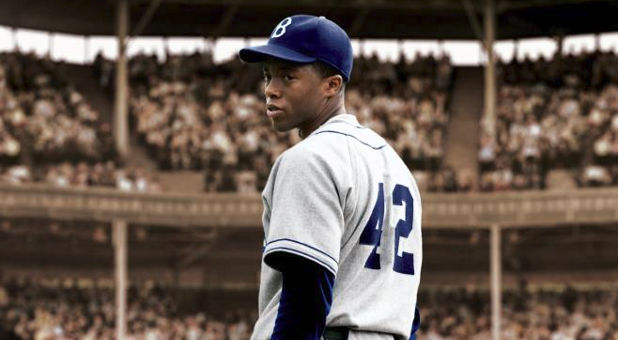Jackie Robinson’s Legacy Comes to Life in Faith and ’42’
The Jackie Robinson biopic 42 premieres this weekend, and all eyes are on the life of Jackie Robinson and the general manager who hired him, Branch Rickey. As people delve deeper, what is coming to the surface are stories of the deep faith in Christ that kept both Robinson and Rickey going in the face of terrible persecution.
An investigation into the history behind the movie shows that it was, in fact, Branch Rickey’s Christian faith that led him to break the color barrier in baseball.
Brought up by a strongly devout mother in Southern California, religion stuck with Jackie throughout his life. Chadwick Boseman, the promising new actor who was chosen to portray the baseball legend in 42, says that Robinson’s faith “absolutely” impacted the results.
“I think he believed that God was with him,” Boseman said in an interview with Movieguide’s Evy Baehr. “That’s why he was able to make it through this. He had a warrior’s spirit.”
In 2013, we can look back on Jackie Robinson’s story with nothing but admiration, but in 1947, when Robinson first took the field in a Dodger’s uniform, he was almost universally viewed with derision. Insults were hurled at him, entire teams threatened not to show up to play, and even some of his own teammates threatened boycott.
“He had to turn the other cheek.” Celebrated film composer Mark Isham told Movieguide at the premiere of 42. “This is not usually the way you win most fights … although perhaps it’s the most successful way.”
“Turning the other cheek” is a line so common that many forget where it originated. Its origin is from the Sermon on the Mount in the biblical book of Matthew. Jesus gathers his followers around Him and presents this statement as a philosophical alternative to the much older “an eye for an eye” concept.
“I say to you, do not resist an evil person.” Jesus commands in Matthew, Chapter 5. “Whoever slaps you on your right cheek, turn the other to him also.”
This is the path that Jackie Robinson took.
Beliefnet.com, a religious website, makes the interesting point that this was not simply “an act of passivity,” but, in Jesus’ time as well as Robinson’s, it was an act of “resistance.” Jesus said to resist—but to not do so using the same evil methods of those harming you.
Nowhere is this biblical truth restated so well than in a scene between Jackie and Dodgers General Manager Branch Rickey in the movie 42.
Rickey, portrayed by Harrison Ford in the movie, is forming his “pact” with Jackie Robinson. Rickey points out to Jackie that everyone in the business will be out for his blood.
“Echo a curse with a curse, and they’ll hear only yours,” Rickey points out, steering Robinson away from the “eye for an eye” concept, just as Jesus does in the book of Matthew. “Your enemy will be out in full force,” Rickey goes on to say, “And you cannot meet him on his own low ground.”
Robinson himself recognized that it was God’s strength getting him through his fight against racism. In another scene portrayed in 42, Jackie is talking to his wife, Rachel, just before he’s officially put on the Dodgers lineup.
Rachel cautions him, saying, “The closer you get, the worse they’ll be. Don’t let them get to you.”
Jackie replies, “I won’t; God built me to last.”
It is obvious, both through the lines of the movie and the stories on paper, that God was the steadying force through the hard first years of Jackie’s time as a Dodger.
Faith in God was Jackie’s support through the difficult times, but for Rickey it is what gave him his inspiration and purpose. Already successful in the baseball world, Rickey was taking a huge risk in breaking Major League Baseball’s color barrier.
Ford describes Rickey as a man with “a very strong moral understanding. He was a very religious person … never went to games on Sunday.” Ford told Movieguide that Rickey “felt a moral obligation to bring social justice into the game.”
In a 42 scene between Rickey and the manager of a rival team, we discover what motivated Rickey so deeply that he would risk everything for this cause.
“You think God likes baseball, Herb?” Rickey asks the fellow manager.
Herb asks Rickey to explain what in the world he means by that statement, to which Rickey passionately replies, “It means someday you’re going to meet God, and when he inquires why you didn’t take the field in Philadelphia against Robinson, and you say it was because he was a Negro, it might not be a sufficient reply!”
This incredible revelation—that one day we will meet God, and that God Himself does not agree with racism, is inherent to Rickey’s mission. He wants to desegregate baseball because he believes that it’s God’s will.
Is this actually a concept that is found in the Bible, or just something that Rickey formulated from his own sense of civility? In Galatians 3:28, Paul writes, “There is neither Jew or Gentile, neither slave nor free, nor is there male and female, for you are all one in Christ Jesus” (NIV).
Paul writes that all are equal in Christ Jesus. Because of Jesus, God accepts us all equally—no matter our sex, nationality, social position or the color of our skin. Rickey took Paul’s words to heart. In Rickey’s baseball, there was neither black nor white.
In the end, it was Jesus Christ’s gospel message, later echoed by leaders like the Rev. Martin Luther King Jr., that was the inspiration behind Rickey and the strength behind Robinson in their struggle to desegregate baseball.














































